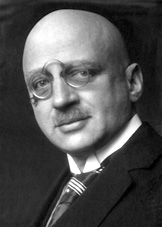- The Nobel Prize in Chemistry 1918
- Fritz Haber
-
The Nobel Prize in Chemistry 1918 was awarded to Fritz Haber "for the synthesis of ammonia from its elements".
Fritz Haber received his Nobel Prize one year later, in 1919. During the selection process in 1918, the Nobel Committee for Chemistry decided that none of the year's nominations met the criteria as outlined in the will of Alfred Nobel. According to the Nobel Foundation's statutes, the Nobel Prize can in such a case be reserved until the following year, and this statute was then applied. Fritz Haber therefore received his Nobel Prize for 1918 one year later, in 1919.
The Haber process is the nitrogen fixation reaction of nitrogen gas and hydrogen gas, over an enriched iron or ruthenium catalyst, which is used to produce ammonia. The Haber process is important because ammonia is difficult to produce on an industrial scale, and the fertilizer generated from the ammonia is responsible for sustaining one-third of the Earth's population.

Fritz Haber
-
Health and Chemical more >
-
Hot Products
- 98-97-5 2-Pyrazinecarboxylic acid
- 8002-53-7 Montan wax
- 12210-38-7 Sulfate(1-), trioxo-(9CI)
- 568572-17-8 Phenol, 4-[[4-[4-[4-[[4-(1-methylethoxy)phenyl]sulfonyl]phenoxy]butoxy]phenyl]sulf onyl]-
- 1981-58-4 Benzenesulfonamide,4-amino-N-(4,6-dimethyl-2-pyrimidinyl)-, sodium salt (1:1)
- 122097-34-1 Cobalt manganese bromide
- 614-33-5 GLYCERYL TRIBENZOATE
- 270573-71-2 4 5-DIHYDROXY-1 3-BENZENEDISULFONIC ACI&
- 2004-70-8 1,3-Pentadiene, (3E)-
- 95896-87-0 1,3-Cyclohexadiene,5-bromo-(9CI)
- 657-84-1 Sodium p-toluenesulfonate
- 18410-62-3


